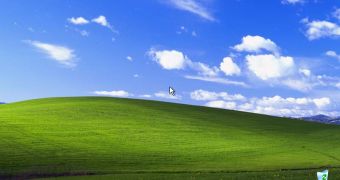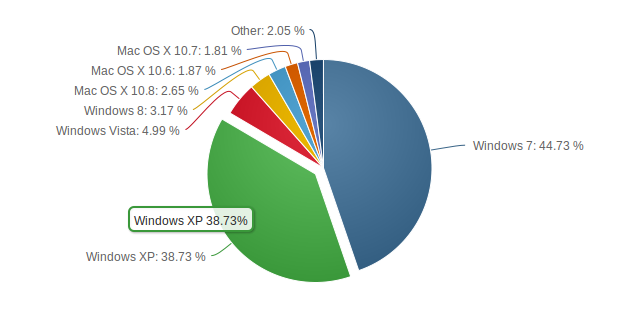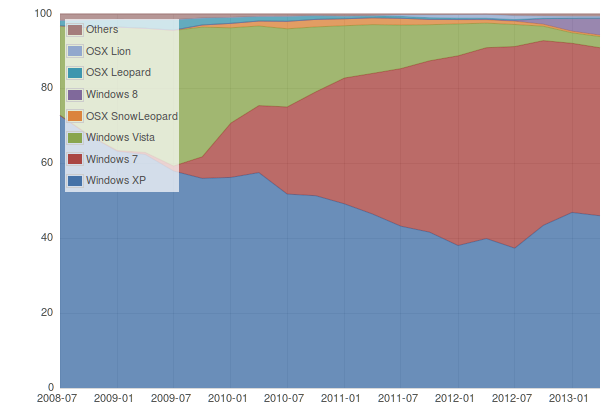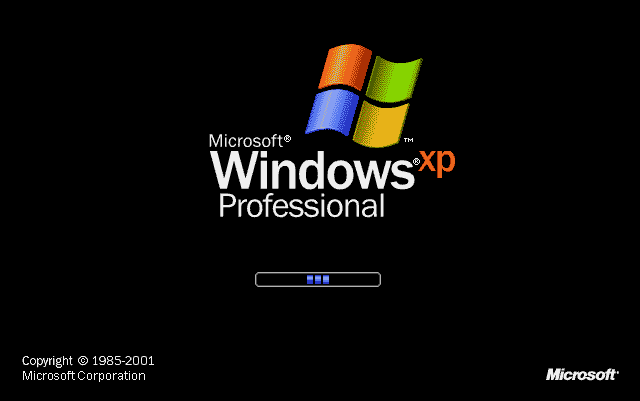Another era will soon come to an end. Microsoft will stop providing updates and security patches for Windows XP as of April 8, 2014, so moving users to a newer Windows version has become a priority.
The tech giant’s strategy is pretty simple: the Softies are using every single occasion, be it an interview, a public event, a press release, a blog post, or just a simple statement to remind users that sticking to Windows XP beyond that date would be risky. So risky that they could actually lose important data and personal details in case some hacker finds a flaw in this operating system.
The soon-to-be 12-year-old operating system is still amazingly popular, with many people claiming that this is Microsoft's most successful Windows version to date. And figures released by third-party market researchers across the world do nothing more than to confirm this.
But Windows XP is no longer a secure working environment, Microsoft has said so many times, so the company has even launched a retirement website to remind users that moving to Windows 7 or Windows 8 is essential for their computers' security.
Security companies across the world have joined the effort and tell users to do this, even though everybody agrees that dumping XP and switching to a newer Windows version takes a lot of time, money, and other resources.
“There's certainly the potential for a lot of havoc, for instance new internet-propagating worms that target Windows XP systems, or even just an increase in Internet Explorer 8 browser exploits that could open the doors wide for all manner of malware infections,” Joshua Long of Sophos said in early April.
“If you don't think you can afford it, skip the Starbucks for a few months and set aside that money for a Windows upgrade.”
In addition, the tech giant shows absolutely no mercy for Windows XP and clearly stated that it had absolutely no intention to extend support for this old OS. And we can easily see why. Microsoft needs Windows 8 to be successful, and with so many people sticking to XP and 7, that's not going to happen too soon.
Net Applications data shows that Windows XP remains the second most popular operating system in the world, despite Microsoft's efforts to move users to a new Windows version.“A year from now will mark the final milestone for Windows XP – that of its end of support date. Starting April 8, 2014, Microsoft will no longer provide support for Windows XP users. This means that customers and partners will no longer receive security updates to the operating system or be able to leverage tech support from Microsoft after this time,” the company explained, adding that it's really keen on sticking to this retirement date.Analyst firms across the globe are also playing a key role in this transition. Gartner, for instance, recommended everyone to “prepare now” for the Windows XP end of support, while also providing a few pieces of advice on how to make the transition faster and more affordable.
“Most organizations have far too many applications. Organizations where users are administrators typically have one application for every 10 users, with about half of these requiring Windows to run,” Gartner explained.
“For critical applications that can run on Windows 7, consider moving these users first. If Windows 7 can't be used, prioritize these applications and users so that you can move them as soon as possible.”
Users, on the other hand, don't seem to really care about it. And Windows XP's current market share is the living proof that this was one of the most popular software products in Microsoft's history.
Market researcher Net Applications revealed earlier this month that Windows XP was still running on 38.73 percent of computers worldwide, with only a slight drop recorded from the month before.
Figures concerning the Unity platform revealed that Windows XP is even more popular than Windows 7.Statistics provided by gaming platform Steam also confirmed that Windows XP is still a popular choice among gamers, with 8.72 percent of the systems running Valve's application also based on the 11-year-old operating system.Microsoft Gold Partner AppSense claims that no less than 45 percent of the organizations are still running Windows XP, even though the tech giant clearly explained that moving businesses from this old platform is a priority.
In New Zealand, for instance, half a million computers are still showing the Windows XP logo whenever the computer boots up, despite Microsoft's efforts to promote Windows 7 and Windows 8.
And still, there are some analysts who believe that dumping Windows XP and embracing a newer operating system isn't such an important thing to do. Richard Edwads of Ovum said in a statement that a fully patched Windows XP system should still do its job for a few more years.
“Organizations should consider how their IT budgets might be invested in more innovative projects. First of all, if we assume that Windows XP systems have the latest patches, fixes and up-to-date security software installed (and that Internet Explorer 6 has been replaced with a more modern web browser), then there is no reason to believe that life after 8th April 2014 will be any different than before it,” he said.
Windows XP, you will be missed!In the end, it's your decision. But if users indeed decide to upgrade, it's a win-win situation. Everybody gets a more secure operating system that's still receiving updates and patches, while Microsoft boosts sales of its newer platforms. And this is how everything comes down to Windows 8. Why should users upgrade to what they find a very confusing operating system?
 14 DAY TRIAL //
14 DAY TRIAL // 

